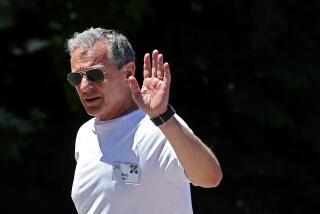Weill’s Withdrawal a Good Call, Experts Say
- Share via
Citigroup Inc. Chairman Sanford I. Weill made the decision over the weekend to withdraw his nomination to the board of the New York Stock Exchange because he had little to gain and much to lose from a public battle with New York Atty. Gen. Eliot Spitzer, securities lawyers say.
The NYSE on Friday recommended Weill to be one of a dozen directors overseeing public investors’ interests on the exchange. Weill retreated Sunday after Spitzer called the nomination an “outrage.”
Citigroup, the world’s largest financial company, agreed to pay $400 million last year to settle charges it misled investors by issuing tainted stock research. Shareholders of fallen companies including Enron Corp. and Global Crossing Ltd. also are suing Citigroup over the bank’s role in their failure.
“It seems like putting the cat in charge of the canaries,” said Columbia University law professor John Coffee. “Weill has obvious conflicts of interest because of legal claims by retail investors against Citigroup.”
Weill and Citigroup declined to comment.
Had Weill, 70, dug in his heels on the nomination, he could have damaged talks that Citigroup and other U.S. securities firms are having with Spitzer and regulators to come to terms on the final details of a $1.4-billion research settlement, securities lawyers said.
“In this current environment, there would have been nothing to have been gained by Mr. Weill’s standing up to Mr. Spitzer,” said Jacob Frenkel, a former Securities and Exchange Commission enforcement lawyer.
Weill was one of six executives newly nominated to the NYSE board, including Merrill Lynch & Co. Chief Executive Stanley O’Neal and Morgan Stanley Chief Executive Philip Purcell.
The 27-person NYSE board is composed of 12 members from the securities industry, 12 representing public investors and listed companies and three full-time exchange executives. Weill was nominated as a public director rather than as a securities industry representative despite Citigroup’s ownership of Salomon Smith Barney, one of the top five investment banks.
One of the board’s most important roles is to guide management on exchange policy and to review and approve rules on issues such as the independence of directors at NYSE-listed companies and the conduct of brokers on the exchange floor.
In 2002, the exchange saw two public and one industry director resign amid scandals at their companies: Martha Stewart, CEO and chairwoman of Martha Stewart Living Omnimedia Inc.; former Vivendi Universal Chairman and CEO Jean-Marie Messier; and former Salomon Smith Barney Chairman and CEO Michael Carpenter.
“Mr. Spitzer thought the nomination of Mr. Weill was inappropriate at best,” Spitzer spokesman Darren Dopp said. “Mr. Weill is in charge of a company that perpetrated a fraud against investors. It was an outrage that he would be put in charge of protecting investors.”
NYSE Chairman Richard Grasso said: “The nominating committee and I both felt, given Sandy’s extraordinary accomplishments over the past 40 years, that he would have been a valuable contributor to our board. I regret deeply that we will not have the benefit of his contribution.”
An NYSE spokesman said the exchange was searching for a nominee to replace Weill.
Weill abandoned his nomination after facing one of his most difficult years as CEO of Citigroup. He was the focus of Spitzer’s investigation of claims that securities firms misled the public with equity research that was made to curry favor with prospective investment banking clients rather than fairly assess the prospects for companies’ stocks.
“I’m delighted that Sandy is withdrawing,” said Nell Minow, editor of the Corporate Library, a corporate governance Web site.
More to Read
Inside the business of entertainment
The Wide Shot brings you news, analysis and insights on everything from streaming wars to production — and what it all means for the future.
You may occasionally receive promotional content from the Los Angeles Times.










